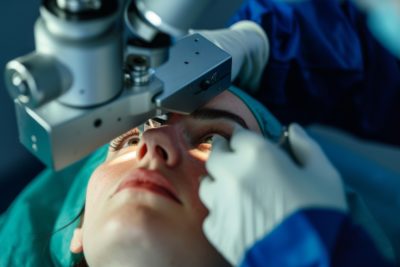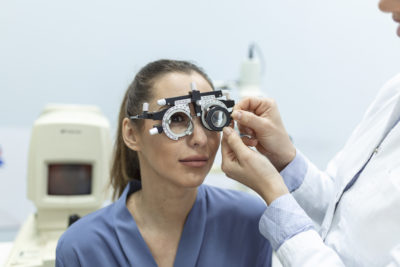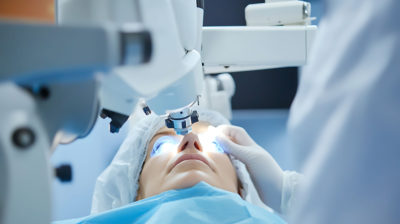Diabetes is a relatively common problem affecting close to 200 million people all over the world. It has achieved a status of a potential epidemic affecting more and more people and that too at a younger age even in their late twenties and early thirties. This is also the most common age when people having myopia request their Lasik eye surgeons for freedom from glasses. As this problem continues to increase and affect a greater segment of population, a larger portion of affected people continue to request for laser vision correction or Lasik surgery.
Earlier diabetes was considered a relative No No (contraindication) for LASIK laser vision correction procedure; however at that time we had limited data and information about the safety and efficacy of LASIK treatment in diabetics. The concerns were therefore more theoretical, rather than based on actual safety of Lasik in diabetics data. There was a concern that operative and postoperative complications of Lasik surgery like infections etc. may be more in diabetic patients and this in turn can limit successful outcomes after LASIK.
There is now a growing body of evidence that shows LASIK procedure can be safely performed in diabetic patients. This is especially true for diabetics with tight sugar control and no pre-existing body or eye problems associated with diabetes.
Rohan, a 36 year old young diabetic, came for pre-LASIK evaluation to the Centre for Lasik Surgery at the Advanced Eye Hospital and Institute in Navi Mumbai, India. He was a well controlled diabetic but unfortunately had never undergone any kind of eye check-up prior to this. His corneal topography (maps), corneal thickness (Pachymetry), and slit lamp check-up was absolutely normal. It seemed that he may be suitable until his retina check-up before Lasik by a Retina surgeon revealed that he had advanced diabetic retinopathy changes. He underwent retinal angiography (Fluorescein Angiography) and subsequently required laser on retina to control the diabetic damage to his retina. He was advised against any form of laser vision correction like LASIK or Femto LASIK or Relex SMILE Lasik. We strongly believe safety first and everything else later.
On the other hand Dr. Roshni a 37 year old diabetic and also a practising general surgeon had diabetes for last five years. Her diabetes parameters were all under control and her retina checkup was also normal. She was advised Smile Lasik and she successfully underwent a Relex SMILE Lasik for her glass number correction.
Whenever we are evaluating any diabetic for LASIK laser vision correction procedure, we do have some concerns. The concerns are as follows:
- Fluctuating prescription: If blood sugar levels are not well controlled, glass power of eyes can fluctuate. This means that we will not be able to get an accurate measurement of a person’s glass power. An accurate reading is a must for planning LASIK laser vision correction procedure.
- Diabetic Retinopathy: People with diabetes should normally be assessed annually for retinal (back part of the eye) diabetic changes (retinopathy). If a person has any form of early or advanced changes on the retina then LASIK Laser vision correction surgery is not recommended. Diabetic retinopathy has a potential to severely impair the vision and also reduce the quality of vision. In such cases LASIK will not give the desirable outcome after the procedure.
- Slower healing: A person with diabetes may heal more slowly after any injury or surgery. LASIK laser vision correction is performed on the cornea which is the outer part of the eye. Post LASIK normal healing of cornea is important and in diabetics this healing can take longer. This longer healing can in turn increase the risk of infection and other kinds of problems. Relex SMILE Lasik where the recovery time is quicker may be a better option for well controlled diabetics for the same reason. In Relex Smile Lasik the amount of cut is just 3-4 mm compared to LASIK or Femto LASIK where a flap is created and the whole cut is as large as 25-27mm. Smaller cut in SMILE Lasik reduce the recovery time and also minimizes the risk of infections.
So whenever we are considering a diabetic patient for LASIK, this is the check-list that we follow-
- Consistent glass power and no fluctuations in glass power for the past 2-3 years
- Normal Pre-LASIK evaluation like corneal topography, corneal thickness, muscle balance testing, dry eye tests etc.
- Normal Retina checkup with no evidence of diabetic retinopathy
- Normal eye pressures with normal healthy optic nerve
- Well controlled sugar levels documented by strict glycemic control and certified by the diabetologist
- No prior or current diabetes related body problems like neuropathy, heart disease etc.
So a person with diabetes and wanting to get Lasik treatment for freedom from glasses, the doors are not closed. A patient with diabetes is not automatically disqualified from consideration for LASIK. It simply means that he or she will have to go through a more extensive Pre-Lasik tests and screening process in order to find out if LASIK laser vision correction is an option. Many diabetics who have no pre-existing complications and keep their blood-glucose levels stable are found to be suitable LASIK candidates.









